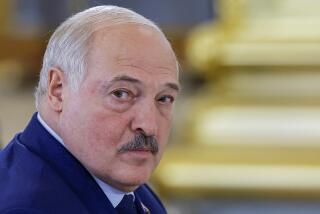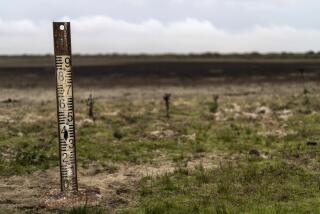Independence for Baltic States : Freedom: Moscow formally recognizes Lithuania, Latvia and Estonia, ending half a century of control. Soviets to begin talks soon on new relationships with the three nations.
MOSCOW — Half a century after carving up the heart of Europe in secret with Nazi Germany, the Soviet Union gave up the choicest of its spoils Friday by recognizing the independence of the three unbowed Baltic states: Lithuania, Latvia and Estonia.
The decision, at the inaugural meeting of the day-old State Council, had been promised by Soviet President Mikhail S. Gorbachev. It was the first concrete episode in the breakup of the Soviet state that he is struggling mightily to prevent.
“We have recognized their independence, and those republics are now separate from the Soviet Union,” Soviet Foreign Minister Boris N. Pankin said at a Moscow news conference. “We are witnessing a historic point in time.”
Baltic leaders, whose governments had already broken official ties to the Soviet Union, hailed the Kremlin move, although many in the states said it came years too late. “The fact that this decision has been made is a very joyful and positive act in all aspects, not only to Lithuania, Latvia and Estonia, but also to the Soviet Union itself and the whole world,” Lithuanian President Vytautas Landsbergis told reporters in Vilnius.
But about an hour’s drive away, in the university city of Kaunas, at least one Lithuanian shrugged off the news. “I think Lithuania was always free. My grandfather and father said I must say that Lithuania was always free,” Lina Lagunaite said. “Today doesn’t change that.”
The United States--which never recognized the Baltics’ forced absorption by the Soviet Union but did little to help its democratically elected governments in their face-off with Moscow--extended diplomatic recognition Monday. About 50 other countries have also established ties.
Pankin said talks will soon begin with the Baltics on a range of issues--from redefining economic relations to the fate of the 250,000 or so Soviet military personnel stationed in their territories.
But one aspect of the Soviet decision will raise hackles among many in the Baltics. Although finally allowing its neighbors’ independence, the Soviet Union again refused to acknowledge that it had annexed them by threats and brute force in 1940, referring only to the “concrete historical and political condition” on the eve of World War II.
In other developments:
* Iran, a southern neighbor of the Soviet Union, applauded communism’s fall and the Baltics’ independence but accused Moscow of a double standard on the Muslim republics. “We accept with difficulty that some republics should be independent because Westerners wish it, while the others cannot become independent because Westerners do not wish it,” Iran’s President Hashemi Rafsanjani said on Tehran Radio, adding that Iran reserves the right to defend Soviet Muslims in any confrontation with Moscow.
* In Moldova, protesters demanding the release of six dissident parliamentarians blocked rail lines. The dissidents are part of a movement that this week declared Moldova’s eastern, largely Russian region an independent republic. That act was judged unconstitutional by Moldovan authorities, who themselves had proclaimed their independence only the previous week.
* Azerbaijan established its own “National Ministry of Defense,” headed by a former deputy commander of Soviet forces in Germany. Uzbekistan began forming a national guard. Georgia said it was ending its participation in all Soviet government bodies.
* The Presidium of the Russian Supreme Soviet, the Russian Federation’s highest executive authority, ordered that Leningrad, the cradle of the Bolshevik Revolution, get back its old name of St. Petersburg. That move is in keeping with the wishes of voters, as expressed in a citywide referendum last June.
* And in another blow at a symbol and ritual of Soviet rule, Air Marshal Yevgeny I. Shaposhnikov, the defense minister, canceled the traditional Nov. 7 Revolution Day parade across Red Square. One Moscow newspaper said the reason was the cost.
At the Council
The State Council’s unanimous vote on the Baltics came only half an hour after it convened with Gorbachev in the chair.
The fledgling institution was created Thursday by the Congress of People’s Deputies as part of a wholesale realignment and decentralization of power supposed to create a new, looser confederation in place of the Soviet Union.
Russian Federation President Boris N. Yeltsin, whose government had already recognized Baltic independence, attended, as did high-ranking officials from the Ukraine, Kazakhstan, Armenia, Turkmenistan, Georgia, Byelorussia, Kirghizia and Azerbaijan, the Interfax news agency reported.
Estonia’s prime minister, Edgar Savisaar, was present as the representative of all three Baltic nations.
“Mikhail Gorbachev congratulated me and the whole Estonian state, wished us all success and happiness,” Savisaar told Estonian Radio afterward.
It was a major change of position by Gorbachev, who last year had secured passage of a law delaying a Soviet republic’s secession by at least five years.
With the State Council’s vote, an often bitter and sometimes violence-marred struggle over the past three years by mass movements and leaders in the small lands on the northwestern shoulder of the Soviet Union came to a successful end.
“It is important to realize just how historic this day is, both for the Balts and for our union,” Vitaly I. Churkin, the foreign minister’s spokesman, told reporters. “The most important thing is that the three Baltic states now have their independence, and we hope we can continue to have close, friendly and warm relations.”
The State Council directed the Soviet Foreign Ministry to aid efforts by Estonia, Latvia and Lithuania to resume their status as full-fledged members of the world community by supporting their applications for seats in the United Nations and the Conference on Security and Cooperation in Europe.
History of Shame
The circumstances of the Baltics’ annexation, one of the most cynical, Machiavellian episodes in the history of Soviet diplomacy, means that letting them go will encourage centrifugal forces in other sections of the country.
Once provinces of Imperial Russia, the Baltic states gained independence with the Treaty of Versailles after World War I. They were independent during the period between the wars, but in 1939, the Kremlin, worried about the rise of Adolf Hitler’s Germany, forced their governments to agree to the basing of Red Army units on their territories.
That same year, Hitler and Josef Stalin found enough common ground to close a deal: the Molotov-Von Ribbentrop pact, which included secret protocols consigning the Baltic states, eastern Poland and Bessarabia to the Kremlin’s orbit.
Although two years ago the Soviet Parliament condemned the secret protocols as “legally untenable,” and, thus, null and void, the Kremlin leadership maintained, and judging by the State Council’s action still maintains, that the annexation of Latvia, Lithuania and Estonia was done in a wholly democratic and voluntary manner.
But the commonly accepted historical record is far different. In Estonia, for example, a “People’s Assembly” was convened in Tallinn on July 21, 1940, with Soviet troops in the hall at least part of the time. Within an hour, the assembly proclaimed by acclamation the formation of a Soviet and socialist form of government. The next day, Estonia’s new rulers applied for membership in the Soviet Union.
In the other two republics, similar puppet assemblies took both actions in a single day.
In other lands captured by the Soviets as a result of World War II, there also has been a flare-up of separatist sentiments, and the State Council’s decision will fan them. Moldova, largely made up of Bessarabia, declared its independence Aug. 27, and the western Ukraine--the chunk of Poland seized by the Soviets in 1939--has become the hotbed of pro-independence feeling in that republic.
But as Friday’s decision to recognize Baltic independence began to seem inevitable, the Kremlin position became that those republics constitute a unique case. Until the Soviet takeover, Estonia, Latvia and Lithuania belonged to the League of Nations, sent their own teams to the Olympics and built pavilions at international expositions. The other Soviet republics did not.
Chatting with reporters at the Soviet Congress on Thursday, Nikolai I. Ryzhkov, the former prime minister, made a point of noting the difference. He was willing to see the Baltic states leave the union, he said. “But the Ukraine, Byelorussia--they are a different cup of tea altogether,” Ryzhkov asserted.
Modern Resistance
During the period of Gorbachev’s reforms, the Baltics became the hothouse for the anti-Communist, pro-democratic opposition, which in the past weeks has triumphed nationwide to end Communist Party rule and obliterate the political institutions the Communists used to enforce it.
It was in Estonia that the first Soviet public organization, not controlled by the party, was created: the “People’s Front.”
The three republics were the first to demand and obtain the right to implement plans for economic autonomy. Holding candles at gigantic rallies, singing patriotic airs, the Baltic people fought doggedly and peaceably for their cause.
At first, their leaders spoke cautiously of the need for “sovereignty,” and only much later of restoring independence. When Lithuania passed a unilateral declaration to that effect in March, 1990, the first by any Soviet republic, a furious Gorbachev shut off supplies of crude oil and natural gas to bring the rebellious republic to heel.
Estonia and Latvia chose more gradual roads to independence, but the anti-Gorbachev putsch persuaded them to issue formal declarations of independence last month.
The impudence of the residents of the Baltics was a special source of anger for Soviet hard-liners, and it is now clear that they used the region as a laboratory for their violent experiments in how to halt and roll back Gorbachev’s reform program.
In January, in a smaller-scale operation strikingly similar to last month’s failed coup d’etat against Gorbachev, a mysterious committee in Lithuania directed the Soviet army to seize the Vilnius television tower and broadcast studios, a savage, tank-backed assault that caused the deaths of 13 unarmed civilians.
At the same time in Latvia, rogue anti-riot police squads went on lethal rampages.
The Impact
At first glance, the effect on the Soviet Union of the departure of the Baltic trio would seem no more bothersome than a pinprick. The former republics were only 2.8% of the total Soviet population; they covered less than 1% of the Soviet Union’s immense area.
Yet, because of the high degree of economic integration attained under the planned socialist economy, some of the losses will be acute.
For example, the country’s only van, the “Raf,” is built in Latvia. Ports at Tallinn, Riga and Klaipeda were among the most modern in the Soviet Union. Lithuania was a treasure-trove of talent for the Soviet Olympic basketball team.
Of special concern to Moscow are the large numbers of ethnic Russians and other migrants who live in the Baltic states. Their fate was constantly evoked in dire tones by Soviet hard-liners as a reason to combat Baltic separatism.
In its proceedings, the State Council “stressed the need for legal protection for those citizens of the U.S.S.R. who might like either to stay in these republics or leave them,” Pankin said.
He added that the Soviet government would probably demand compensation for economic losses incurred as a result of the Baltic breakaway, but gave no specifics.
Many Soviet officials, as well as their counterparts in Estonia, Latvia and Lithuania, believe the overlapping of their economies, transport and communications will force them to live together, independent or not. “They don’t want to get out of the common economic space that we share with them,” Pankin said.
RELATED STORIES: A3-A10
More to Read
Sign up for Essential California
The most important California stories and recommendations in your inbox every morning.
You may occasionally receive promotional content from the Los Angeles Times.










